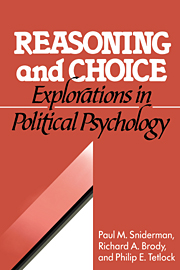Book contents
- Frontmatter
- Contents
- List of tables and figures
- Preface
- 1 Introduction: major themes
- 2 The role of heuristics in political reasoning: a theory sketch
- 3 Values under pressure: AIDS and civil liberties
- 4 The principle–policy puzzle: the paradox of American racial attitudes
- 5 Reasoning chains
- 6 The likability heuristic
- 7 Democratic values and mass publics
- 8 Ideological reasoning
- 9 Information and electoral choice
- 10 Stability and change in party identification: presidential to off-years
- 11 The American dilemma: the role of law as a persuasive symbol
- 12 Ideology and issue persuasibility: dynamics of racial policy attitudes
- 13 The new racism and the American ethos
- 14 Retrospect and prospect
- Notes
- Bibliography
- Subject index
- Author index
5 - Reasoning chains
Published online by Cambridge University Press: 05 May 2010
- Frontmatter
- Contents
- List of tables and figures
- Preface
- 1 Introduction: major themes
- 2 The role of heuristics in political reasoning: a theory sketch
- 3 Values under pressure: AIDS and civil liberties
- 4 The principle–policy puzzle: the paradox of American racial attitudes
- 5 Reasoning chains
- 6 The likability heuristic
- 7 Democratic values and mass publics
- 8 Ideological reasoning
- 9 Information and electoral choice
- 10 Stability and change in party identification: presidential to off-years
- 11 The American dilemma: the role of law as a persuasive symbol
- 12 Ideology and issue persuasibility: dynamics of racial policy attitudes
- 13 The new racism and the American ethos
- 14 Retrospect and prospect
- Notes
- Bibliography
- Subject index
- Author index
Summary
Our account of reasoning and choice is centered on the notion that people compensate for informational shortfalls by taking advantage of judgmental shortcuts, or heuristics. The notion of heuristics is a strategic notion, simple and evocative, and there are gains to centering a theory on such a strategic notion, among them clarity and coherence. But there are also risks.
The most serious risk is that heuristics become a buzzword, with every correlation between independent and dependent variables being taken as evidence of a new judgmental shortcut. To warn about this risk is the purpose of this chapter: It demonstrates empirically not only that a judgmental shortcut can be a means to determine the position to take on an issue, but that the “heuristic” can also be itself a consequence of the policy preference.
The analysis of this chapter is set within a larger metaphor, the notion of a chain of reasoning. Such a notion is familiar enough – the idea that first we start with basic premises, then work our way to an appropriate conclusion. But however familiar, the metaphor of a chain of reasoning seems to us misleading; misleading particularly in suggesting that people, starting with the most basic premises of an argument, work their way to a conclusion by moving systematically from the more general to the more specific. As against this presumption of orderly deductive inference, we shall try to show that political reasoning tends to be rather more lively, with people often starting at the beginning of an argument, then skipping directly to its conclusion, and only then filling in the intermediate steps in the argument.
- Type
- Chapter
- Information
- Reasoning and ChoiceExplorations in Political Psychology, pp. 70 - 92Publisher: Cambridge University PressPrint publication year: 1991
- 2
- Cited by



